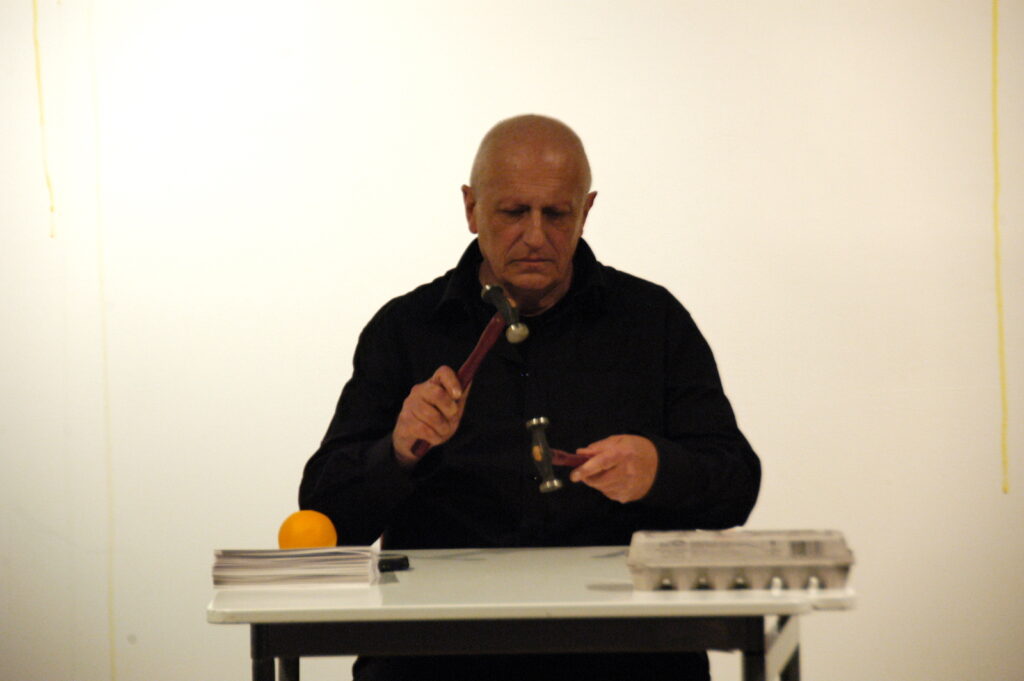By Andrew James Paterson
Norbert Klassen has presented two performances at the 2008 7a*11d Festival (on Friday October 24 and also the following evening—the Saturday night). Both were distinguished by performance presence, deceptively informal but very precise pacing or timing, and a wonderfully perverse humour. Klassen was born in Duisburg, Germany in 1941, and has been living in Switzerland since 1964.
In the late 1960s, Klassen and a collective of performing and writing associates formed STOP F.T. (Studio am Montag), which only presented performances on Mondays since Monday is traditionally a “down” night in the theatre world and also so that collective members could work elsewhere on other nights in other capacities. The group would meet, discuss, and workshop; and scripts and/or performance directions would collectively emerge. The performances tended to range between twelve and twenty-four hours—they were partially scripted and partially improvised. Audiences were not expected to sit for the duration of the play—they were encouraged to stay for a while, leave, return, et cetera. Norbert Klassen describes these original plays as having a “dream narrative”—something may or may not actually be occurring. What is “real” and what is strictly in both the performers’ and audience’s imagination? He also refers to them as a “landscapes of human figures.” Sets and costumes were undertaken by all of the players, or at least as many of the players who made the commitment. Already Klassen and his colleagues in STOP F.T. were moving toward performance art, or at least in a performative direction.
Since 1979, Klassen has presented performances for performance art audiences, while still working as an actor and director in the theatre. In 1985 he became involved in the Black Market International Performance Group. It seems that there are many version of the Black Market story or narrative, so Klassen stresses that he is presenting his version. He credits the founding of Black Market in 1985 to Boris Nieslony, who sought out performers and individuals whom he felt capable of working for considerable duration without script or preparations. Initially there were between six and eight performers (all male, which was not an intention). Later there were a dozen performers, both male and female.
The name Black Market of course suggests underground economies, illicit exchanges, and clandestine espionage activities and so on. Klassen describes the term Black Market as not being restricted to any economic realm. It is anarchic—people all meeting to work together and simultaneously respecting individual space(s). People trusting and letting go of egos for a collective good without some authority figure barking out commands or orders. Black Market is a space or mindset where people find partners and do so without rules. Video documentations of Black Market performances have revealed parallel performances taking place within the same physical framework. Recorded from two different angles, one might think they were watching two different but parallel performances.
Norbert Klassen has great respect for audiences—in their ability to be selective, to retain visual and other information, and to form their own conclusions. He sees his performances (as well as his theatrical works) as being dialogues with audiences. For Klassen, an audience is never a mere convenience. Audiences are to be played with, to be allowed to help shape a performance. He is not a performer who is publicly withdrawing into some extremely private interior or trauma.
The vocabularies of the art world and its exchange systems is a recurring trope in many of Klassen’s performances. It certainly was a key component of his first XPACE performance on October 24. The materials and/or results of his performance were neatly packed into clear plastic boxes and then sold to the highest bidders. But Klassen inverts and twists art auctioning and art markets. He invokes the Warhol maxim Art is What Sells (I also think of General Idea’s cunningly facetious “if it doesn’t sell, then it’s not art”) only to reverse the buyer/consumer roles. He offers to buy the multiple artworks back, after having burnt the paper money. Norbert Klassen has presented this performance widely and internationally, this performance in which he uses acupuncture needles to mark his face, writes ART with blood into his upper left arm, stops the bleeding, and then sells his traces. Audiences overwhelmingly prefer to retain the art object rather than recover their cash investment.
Norbert Klassen does indeed have a rather casual, even facetious, attitude to money and materiality. He lives modestly and travels lightly, preferring not to accumulate too many inflexible possessions (although he is a voracious reader). Norbert Klassen as a solo performer and as a member of Black Market International is highly respected on an international performance circuit. Exchanges between performer and audiences, and between citizen and citizen, are more important to him than material rewards or trophy souvenirs. Norbert Klassen will be up to something during the 7a*11d festival’s final day panel. I cannot predict what he will be doing, but I am quite fascinated by the possibilities.

